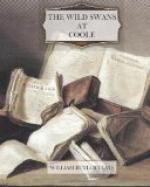|
This section contains 322 words (approx. 2 pages at 300 words per page) |
Simple Things May Arouse Profound Thoughts
First, "autumn" (in stanza 1, line 1) is only one of the four seasons of the year, a very simple occasion that comes every year. However, the poet is trying to depict "autumn", as a time of one's life. The falling leaves and the mild weather symbolizes nearly the end of one's life. Hence, winter, which is freezing cold, represents the death of a person frozen; while summer, which is full of vigour, represents to period of teenager and spring, which is the start of all living things represent new born baby. He brings out this idea of autumn to compare the nature with his own life. When Yeats says "The nineteenth autumn had come upon me", it is a measure of the passing of time. By this, he laments for his passing prime and advancing age.
Second, "twilight" (in stanza 1, line 3) means dusk, the end of a day. "twilight" is a simple daily routine which happens everyday without much significance but the poet uses it to bring out a certain period of life. Like autumn, it brings out the message of "nearly the end", in this case, the death of a person, his friend Robert Gregory.
Third, "trod" and "tread" (in stanza 3, line 6) are only simple walking steps which we see everyday. However, this slow-paces walk brings about a feeling of light-heartedness of the happy swans to the reader. He is envious of the swans which are, "mysterious" and "beautiful." Moreover, small and simple sounds which can hardly be noticed usually like "brimming water" (S1 L5) and "bell-beat of wings" (S3 L5) shows the great passion of the swans. This contrast to what the persona is feeling. He realizes "all's changed" (line 15) while the swans are free and happy.
Therefore, it is true that simple things arouse profound thoughts.
|
This section contains 322 words (approx. 2 pages at 300 words per page) |


